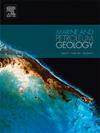Tectonic evolution of the early permian Junggar basin: Insights into a foreland basin shaped by lithospheric folding
IF 3.7
2区 地球科学
Q1 GEOSCIENCES, MULTIDISCIPLINARY
引用次数: 0
Abstract
Foreland basins are shaped by the sedimentary architecture and lithospheric flexure due to the sediment load, slab pull, orogenic growth, and asthenospheric mantle flow. However, it is challenging to differentiate foreland basins from rift basins due to the destructive effects of multiphase orogenesis. Situated at the core of the western Central Asian Orogen Belt, the Junggar Basin holds vital clues regarding the closure of the Paleo-Asian Ocean. There is debate regarding whether it was a compressional foreland basin or an extended rift after the closure of the surrounding oceans. Furthermore, uncertainties persist regarding the fate of the residual oceanic crust and the precise tectonic processes during the collision of the ocean-arc-continent system. Understanding the basin's style during the early Permian period is crucial for deciphering its dynamic tectonic history. This study leverages regional seismic data to reevaluate the overall structure of the Junggar Basin, providing insights into its tectonic context and the mechanisms of intraplate deformation during the early Permian period. The findings reveal significant early Permian deformation features characterized by varying strata thicknesses and unconformities, signifying continuous tectonic activity during deposition. The western and southern depressions that developed from the late Carboniferous to early Permian are in keeping with compressional dynamics and reflect a foredeep basin, while the central uplift corresponds to a forebulge. This study posits that the observed foreland basin system was shaped by lithospheric flexure at the end of the late Carboniferous and lithospheric buckling in the early Permian, which contributed to the creation of uplifted Mosuowan-Baijiahai forebulge in the interior. The Junggar Basin featured a convergent dynamic environment, although the surrounding orogen transitioned into a postcollisional orogen in the Central Asian Orogenic Belt during the early Permian.
早侏罗世准噶尔盆地的构造演化:洞察岩石圈褶皱塑造的前陆盆地
前陆盆地是由沉积结构和沉积负荷、板块拉动、造山运动和星体层地幔流动造成的岩石圈挠曲形成的。然而,由于多相造山运动的破坏作用,区分前陆盆地和裂谷盆地具有挑战性。准噶尔盆地位于中亚造山带西部的核心,是古亚洲洋关闭的重要线索。关于准噶尔盆地是一个压缩性前陆盆地,还是周边海洋闭合后的延伸裂谷,目前还存在争议。此外,关于残余大洋地壳的命运以及大洋-弧-大陆系统碰撞期间的精确构造过程,仍然存在不确定性。了解盆地在二叠纪早期的风格对于解读其动态构造历史至关重要。本研究利用区域地震数据重新评估了准噶尔盆地的整体结构,深入了解了其构造背景以及二叠纪早期板内变形的机制。研究结果揭示了二叠纪早期的重要变形特征,其特点是地层厚度不同和不整合,表明沉积过程中存在持续的构造活动。从石炭纪晚期到二叠纪早期形成的西部和南部凹陷符合压缩动力学,反映了前深盆地,而中部隆起则与前凸起相对应。本研究认为,所观察到的前陆盆地系统是由石炭纪晚期的岩石圈挠曲和二叠纪早期的岩石圈屈曲形成的,这促成了内部隆起的莫索湾-白家海前凸的形成。准噶尔盆地具有汇聚的动力环境,尽管在二叠纪早期,周围的造山带已过渡为中亚造山带的后碰撞造山带。
本文章由计算机程序翻译,如有差异,请以英文原文为准。
求助全文
约1分钟内获得全文
求助全文
来源期刊

Marine and Petroleum Geology
地学-地球科学综合
CiteScore
8.80
自引率
14.30%
发文量
475
审稿时长
63 days
期刊介绍:
Marine and Petroleum Geology is the pre-eminent international forum for the exchange of multidisciplinary concepts, interpretations and techniques for all concerned with marine and petroleum geology in industry, government and academia. Rapid bimonthly publication allows early communications of papers or short communications to the geoscience community.
Marine and Petroleum Geology is essential reading for geologists, geophysicists and explorationists in industry, government and academia working in the following areas: marine geology; basin analysis and evaluation; organic geochemistry; reserve/resource estimation; seismic stratigraphy; thermal models of basic evolution; sedimentary geology; continental margins; geophysical interpretation; structural geology/tectonics; formation evaluation techniques; well logging.
 求助内容:
求助内容: 应助结果提醒方式:
应助结果提醒方式:


